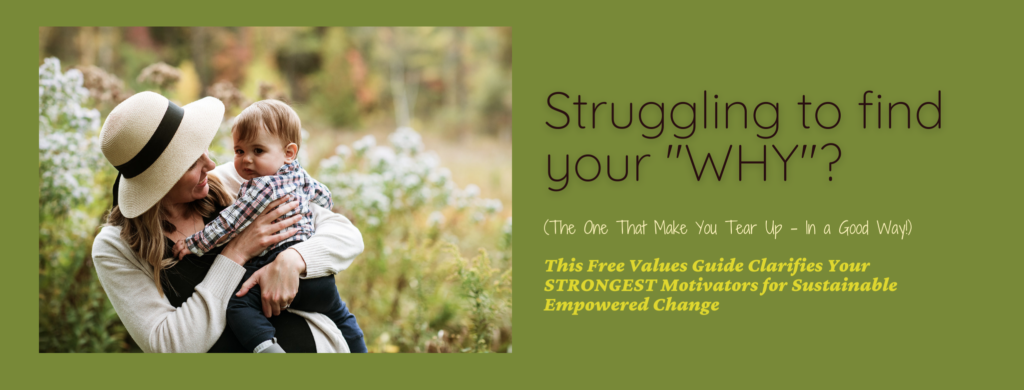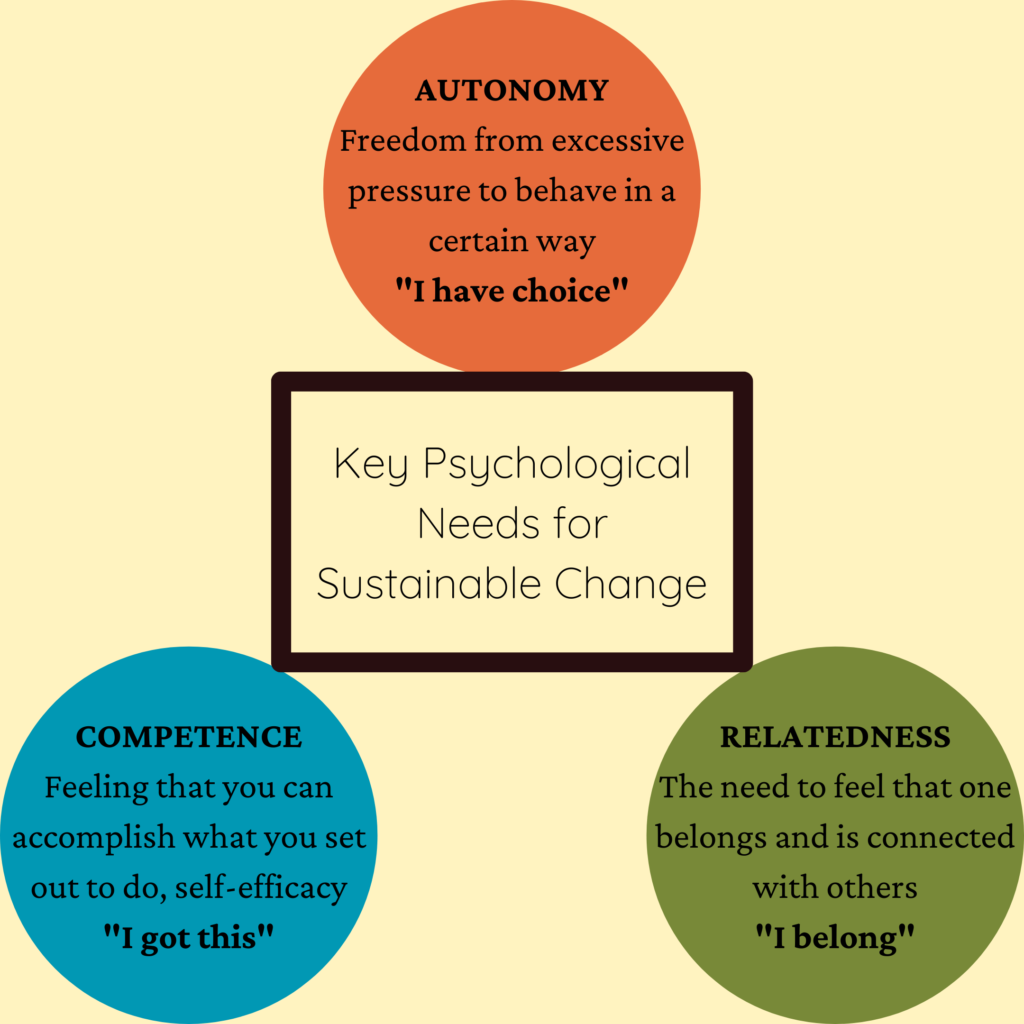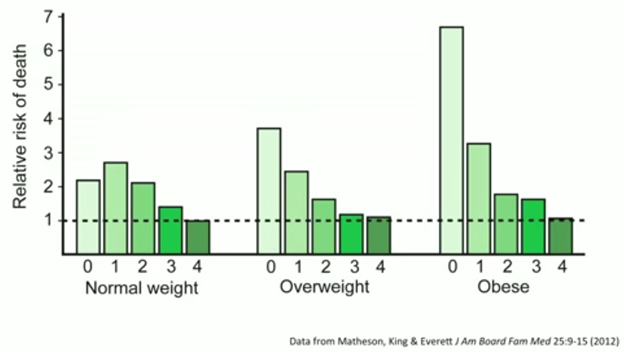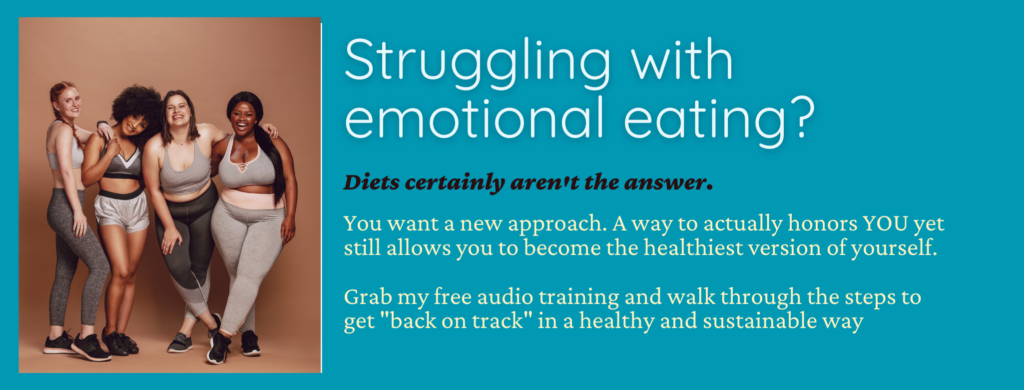Podcast: Play in new window | Download
Subscribe to The Innovative Therapist Podcast! Apple Podcasts | Spotify | RSS | More
Episode 1. Want to get and stay motivated for healthier habits? Have you tried every diet in the book and are beyond frustrated with yourself that you haven’t had the success you want? This week’s episode is for you.
Welcome to the Motivation Made Easy Podcast!
What to Expect
This first full episode of the Motivation Made Easy podcast goes over the ways we are getting things REALLY wrong when it comes to our health and how we typically approach weight loss.
My approach to motivation is rooted in Self-Determination Theory, a well-studied theory of motivation. This theory has been studied in controlled lab settings and long-term longitudinal studies across SO many areas, including health but also in education, sports, parenting, psychological treatment, and so much more.
In this podcast we learn about motivation and how it REALLY works, and how to apply it to our relationship with food, and beyond!
“I’m terrified I’m wasting my life.”
Before we dive in to all things motivation, health and weight, and I wanted to share something with you.
I wrote this statement in a journal in the middle of the diet-binge cycle. And frankly, I kind of was. I was disconnected and distracted, self-conscious about my body almost 100% of the time, and generally feeling like a failure, though no one truly knew the depths of this pain.
I’m here to tell you it’s never too late to gain control of your eating, respect your body, and live a life that’s TRULY consistent with your values. But you need to take the first step.
One of the very first steps in developing truly autonomous and body respecting motivation is to clarify what actually matters to you. Not your mom, not your sister, not your best friend, YOU.
The more you reflect on this, the more you can connect your values to your behaviors in a sustainable and empowering way.
Grab the free guide at DrHondorp.com/goals and get started today. I promise you, it’s never too late to stop dieting and start truly living.

The Field of Weight Management is Missing the Mark
Let’s dive in and get started with some of the MANY ways the diet and weight loss industry and the weight management field in general is missing the mark. I should know, I had been a part of it for many years now, as a researcher developing and delivering weight management interventions for NIH-funded research trials.
A few of the ways we are failing (as a field)
- The 78 billion dollar weight loss industry (as of 2019) and the ways they profit based on things NOT working for us. Repeat customers, they need. (Said in a yoda voice).
- The 3 Key Psychological Needs we all have when it comes to any sustained habit changes (autonomy, competence, and relatedness; Deci & Ryan, 2012) and how almost all of the ways we approach weight loss and dieting reduce these, making is VERY hard to make changes that stick.

- How calorie restriction causes biological stress and increased cortisol which is one of the MANY ways dieting undermines our ability to achieve our goals and reduces our sense of effectiveness (Tomiyama et al., 2011). You see, we need to feel some degree of success to want to keep going long-term. Makes sense, right? Well, the fact is that MOST weight loss programs result in weight gain over time, not loss. At some point we need to start looking at the system, not the person.
- The ways we GREATLY overestimate the impact of weight on our health, and how little of a role it truly plays based on science. This doesn’t mean that weight does not matter. Most people I work with will tell you it matters very much to them, however, the ways in which we are told it matters and that we “need” to lose weight, are actually not often true. In fact, there’s good data that focusing on weight loss will take you away from your goals, not towards them.
- Most importantly, we talk about what the heck can be done about this? How can we improve things on an individual and larger systems level?
Health at Every Size® Movement – How Does This All Make Sense?
There are many studies I could cite demonstrating the misunderstanding of weight and health and their link. However, the one I’ll start with is a study by Matheson and colleagues (2012). In this study, they:
- Measured risk of death between those in higher weight ranges and those in the “normal” weight range (the body mass index is crap, but it’s what we have). They looked at how many folks were doing 4 health habits, these habits were: 1) Regular exercise, 2) Balanced eating with fruits and veggies, 3) Not drinking alcohol to excess, and 4) Not smoking.
- When they measured those in the “obese” BMI range, and they weren’t doing any of the 4 behaviors, there was an increased risk of death compared to the overweight and normal ranges. However, this doesn’t mean that weight was causing increased risk of death. We know that weight bias or stigma plays a HUGE role in our health and can definitely worsen it, so that alone might have been the cause. The reality is, we don’t KNOW the cause, we can only speculate.
- However, when people in the obese range were doing all 4 healthy habits, their risk of death was the exact same as those in the normal and overweight ranges.
- This suggests that we can pursue health promoting behaviors at any size and gain benefit from it.
- We talk in Episode 16 about the Health at Every Size® Movement and many of the myths about it, including that HAES® does not claim that everyone IS healthy, or that weight loss is bad, per se, it’s just that we need to take a whole picture approach, versus what we currently do. Which is essentially, say, you are X weight, you must lose weight.

The Holy Grail of Sustainable Motivation – And Why Weight Loss Focus Wont Get You There
We dove deeper into Self-Determination Theory and the three key psychological needs we all need for long-term habit change and autonomous motivation (the holy grail of sustainable motivation).
There are unfortunately many ways we are setting up people for failure with how the dieting and weight loss industry approaches weight loss. It’s time to understand, so we can make a change.
Life is too short to keep doing the same ineffective thing over and over, my friends.
Ways To Use This Information to Move Towards Optimal Health and Well-Being
FAQ: Instead of focusing on weight loss and dieting, what should we be doing instead?
Great question, there are many things we can feel effective with when it comes to our health.
- Focus on habits and feel great about it. Although we cannot always control the number on the scale or what society tells us is healthy, we can control our habits and how we take care of ourselves. Just look at the above graph. We do have control, but focusing on weight loss and that pesky scale is distracting us from what works, and leading us to lose faith in our abilities in the process. There are many areas where regular and joyful movement and nourishing nutrition can make a HUGE difference in our health, energy levels, and quality of life. You can feel effective, but almost every time, focusing on weight loss undermines that feeling. It’s time for a new approach.
- Make changes based on what’s most important to YOU. We know a lot about the science of motivation, and the fact is, making changes from a place of freedom and choice, not external pressure means we are more likely to keep up the changes. So how do we do this? You can start by changing the way you talk to yourself. Perhaps ask yourself “What do I really want? What do I want to focus on?” Want some help with the HOW? I break down the 5 steps to tuning in to your body as a learned skill in this free audio.
- Spread this information and work together. Reducing misinformation is key to reducing shame and weight stigma and to feeling understood and accepted. Share this podcast with family and friends. Let’s actually talk about how what we are doing isn’t working and commit to spending less money on diet and weight loss products and more money and time working on things that matter.
- Consider other things you could focus your energy on instead of calorie counting. This could be learning some new plant-based recipes, or maybe it has zero to do with food. Maybe you want to free up time to focus on a side project that really jazzes you, or work on a new hobby or passion. Or just spend more time getting present with the people in your life. It does not matter what it is, but it’s important to take time to reflect on what’s truly important to you, and then take action towards it.

Don’t Miss an Episode – Join The Insider’s Community and Hit Subscribe Now!
To make sure you never miss a new episode, go here to make sure you are part of my Insider’s Community where you will get updates about new blog posts and podcast episodes and first dibs on new resources and programs!
Follow Me on Instagram * Facebook * Pinterest
References
Deci, E. L., & Ryan, R. M. (2012). Self-determination theory. In P. A. M. Van Lange, A. W. Kruglanski, & E. T. Higgins (Eds.), Handbook of theories of social psychology (p. 416–436).
Matheson, E. M., King, D. E. & Everett, C. J. (2012). Healthy lifestyle habits and mortality in overweight and obese individuals. The Journal of the American Board of Family Medicine, 25, 9-15.
Tomiyama, J., Mann, T., Vinas, D., Hunger, J., Dejager, J., & Taylor, S. (2011). Low Calorie Dieting Increases Cortisol. Psychosomatic Medicine, 72, 357-364.

This podcast is so refreshing to listen to. By the middle of the episode, I was already feeling more motivated and autonomous, therefore making me more willing to make positive choices. This was a great way to start off my day and I already feel more productive and compassionate towards myself. Specifically, I love the part when Dr. Hondorp discusses autonomy and what that means in terms of body respect. I am so excited for the rest of the material that the Motivation Made Easy podcast will delve into!
Thanks so much for your comment! This is all so great to hear! 🙂